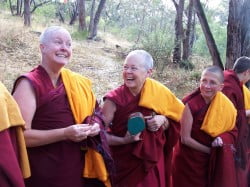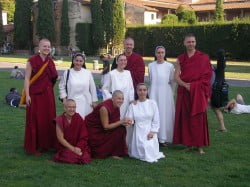A Monastic’s Mind
Ven. Thubten Chodron
Excerpted from a talk given at a group of newly ordained monks and nuns at Tushita Meditation Center in Dharamsala, 2001.
In a discussion with Amchok Rinpoche several years ago, he said to me, “The most important thing as a monastic is to have a monastic’s mind.” I’ve thought about this over the years and have concluded that when we have a “monastic’s mind,” things will naturally flow. Our whole way of being is as a monastic. We can think about what a “monastic’s mind” means for years. Here are some of my reflections.
One of the first qualities of a monastic’s mind is humility. Humility has to do with transparency, which is related to self-acceptance. With humility, our mind relaxes. “I don’t have to be the best. I don’t have to prove myself. I’m open to learning from others. It makes me feel good to see others’ good qualities.” Humility can be difficult for us Westerners because we were raised in cultures where humility is seen as weakness. People in the West pull out their business cards: “Here I am. This is what I’ve accomplished. This is what I do. This is how great I am. You should notice me, think I’m wonderful, and respect me.” We were raised to make others notice us and praise us. But this is not a monastic’s mind.
As monastics, our goal is internal transformation. We’re not trying to create a magnificent image that we’re going to sell to everyone. We have to let that seep into our mind and not worry so much about what other people think. Instead, we should be concerned with how our behavior influences other people. Do you see the difference between the two? If I’m worried about what you think of me, that’s the eight worldly concerns. I want to look good so that you’ll say nice things to me and will praise me to others so that I’ll have a good reputation. That’s the eight worldly concerns.
On the other hand, as monastics, we represent the Dharma. Other people will be inspired or discouraged by the way we act. We’re trying to develop bodhicitta, so if we care about others, we don’t want to do things that will make them lose faith in the Dharma. We do this not because we’re trying to create a good image and have a good reputation but because we genuinely care about others.
If I hang out in chai shops all day or if I shout from one end of the courtyard to the other, other people will think poorly of the Dharma and the Sangha. If I jostle people when I go into teachings or get up in the middle and stomp out, they’re going to think, “I’m new to the Dharma. But I don’t want to become like that!” Thus, in order to prevent this, we become concerned about the way our behavior affects other people because we genuinely care about others, not because we’re attached to our reputation. We must be clear about the difference between the two.
A monastic’s mind has humility. It also is concerned for the Dharma and others’ faith in the Dharma.
Generally, when we are first ordained, we don’t feel this concern for the Dharma and for others’ faith. New monastics generally think, “What can the Dharma give to me? Here I am. I’m so confused. What can Buddhism do for me?” Or, we think, “I’m so sincere in wanting to attain enlightenment. I really want to practice. Therefore others should help me to do this.”

As we remain ordained longer and longer, we come to understand how our behavior affects other people, and we begin to feel some responsibility for the continuity of the teachings. These precious teachings, which have helped us so much, began with the Buddha. They were passed down through a lineage of practitioners over the centuries. Because those people practiced well and remained together in communities, we are fortunate enough to sit on the crest of the wave. We feel so much positive energy coming from the past. When we receive ordination, it’s like sitting on the crest of the wave, floating along on the virtue that all the Sangha before us have created for over 2,500 years. After some time, we begin to think, “I’ve got to contribute some virtue so that future generations can meet the Dharma and other people around me can benefit.” We begin to feel more responsible for the existence and spread of the teachings.
I’m sharing my experience. I don’t expect you to feel this way now. It took me many years to recognize that I was no longer a child in the Dharma, to feel that I am an adult and so need to be responsible and give to others. Often we come into Dharma circles or into the Sangha thinking, “What can I get out of the Sangha? How is being with these monks and nuns going to benefit me?”
We think, “We’re going to have a monastery? How will it help me?” Hopefully after some time our attitude changes and we begin to say, “What can I give to the community? How can I help the Sangha? What can I give to the individuals in the community? What can I give to the lay people?” Our focus begins to change from “What can I get?” to “What can I give?” We talk so much about bodhicitta and being of benefit to everybody, but actually putting this into practice in our daily life takes time.
Slowly, our attitude begins to change. If we look at our ordination as a consumer and think, “What can I get out of this?” we’re going to be unhappy because we’ll never get enough. People will never treat us well enough or give us enough respect. However, we’ll be much more satisfied as monastics if we start to ask ourselves, “What can I give to this 2,500 year-old community? How can I help it and the individuals in it so that they can continue to benefit society in the future? What can I give to the laypeople?” Not only will we feel more content inside ourselves when we change our attitude, but we’ll also be able to make a positive contribution to the welfare of sentient beings.
To make a positive contribution we don’t need to be important or famous. We don’t need to be Mother Theresa or the Dalai Lama. We just do what we do with mindfulness, conscientiousness, and a kind heart. We shouldn’t make a big deal, “I’m a bodhisattva. Here I am. I’m going to serve everybody. Look at me, what a great bodhisattva I am.” That’s trying to create an image. Whereas if we just try to work on our own mind, be kind to other people, support them in their practice, listen to them because we care about them, then slowly a transformation will occur within ourselves. Who we are as a person will change.



